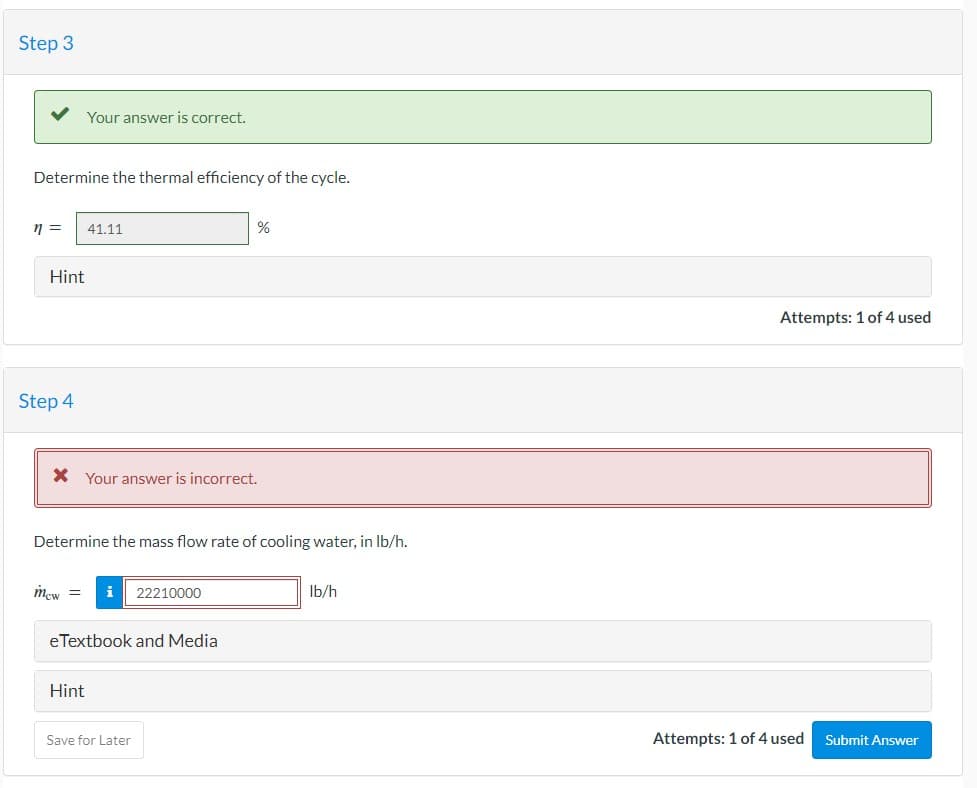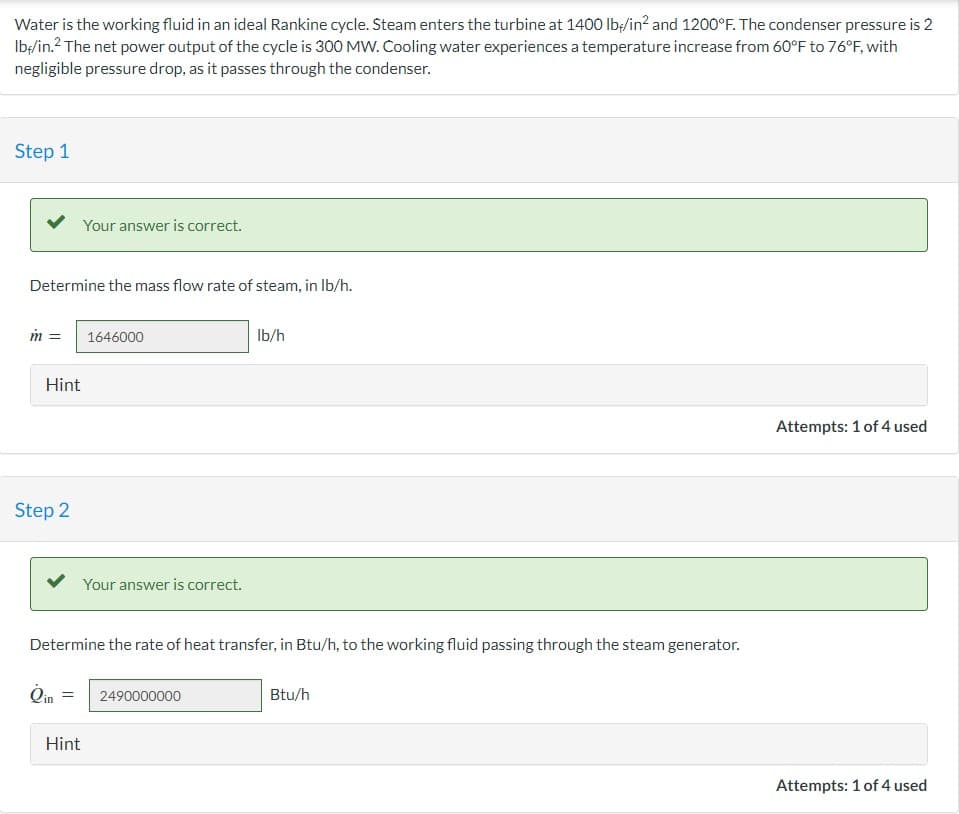Water is the working fluid in an ideal Rankine cycle. Steam enters the turbine at 1400 lb/in² and 1200°F. The condenser pressure is 2 lb-/in.² The net power output of the cycle is 300 MW. Cooling water experiences a temperature increase from 60°F to 76°F, with negligible pressure drop, as it passes through the condenser. Step 1 Determine the mass flow rate of steam, in lb/h. m = Your answer is correct. Hint Step 2 Oin 1646000 Your answer is correct. Determine the rate of heat transfer, in Btu/h, to the working fluid passing through the steam generator. Hint lb/h 2490000000 Btu/h Attempts: 1 of 4 used
Water is the working fluid in an ideal Rankine cycle. Steam enters the turbine at 1400 lb/in² and 1200°F. The condenser pressure is 2 lb-/in.² The net power output of the cycle is 300 MW. Cooling water experiences a temperature increase from 60°F to 76°F, with negligible pressure drop, as it passes through the condenser. Step 1 Determine the mass flow rate of steam, in lb/h. m = Your answer is correct. Hint Step 2 Oin 1646000 Your answer is correct. Determine the rate of heat transfer, in Btu/h, to the working fluid passing through the steam generator. Hint lb/h 2490000000 Btu/h Attempts: 1 of 4 used
Elements Of Electromagnetics
7th Edition
ISBN:9780190698614
Author:Sadiku, Matthew N. O.
Publisher:Sadiku, Matthew N. O.
ChapterMA: Math Assessment
Section: Chapter Questions
Problem 1.1MA
Related questions
Question
STEP 4 PLS

Transcribed Image Text:Step 3
Determine the thermal efficiency of the cycle.
n = 41.11
Your answer is correct.
Hint
Step 4
* Your answer is incorrect.
Mew =
Determine the mass flow rate of cooling water, in lb/h.
Hint
i 22210000
eTextbook and Media
%
Save for Later
lb/h
Attempts: 1 of 4 used
Attempts: 1 of 4 used
Submit Answer

Transcribed Image Text:Water is the working fluid in an ideal Rankine cycle. Steam enters the turbine at 1400 lb/in² and 1200°F. The condenser pressure is 2
lb//in.² The net power output of the cycle is 300 MW. Cooling water experiences a temperature increase from 60°F to 76°F, with
negligible pressure drop, as it passes through the condenser.
Step 1
Determine the mass flow rate of steam, in lb/h.
m = 1646000
Hint
Step 2
Your answer is correct.
Qin
Your answer is correct.
Determine the rate of heat transfer, in Btu/h, to the working fluid passing through the steam generator.
= 2490000000
Hint
lb/h
Btu/h
Attempts: 1 of 4 used
Attempts: 1 of 4 used
Expert Solution
This question has been solved!
Explore an expertly crafted, step-by-step solution for a thorough understanding of key concepts.
This is a popular solution!
Trending now
This is a popular solution!
Step by step
Solved in 6 steps with 1 images

Knowledge Booster
Learn more about
Need a deep-dive on the concept behind this application? Look no further. Learn more about this topic, mechanical-engineering and related others by exploring similar questions and additional content below.Recommended textbooks for you

Elements Of Electromagnetics
Mechanical Engineering
ISBN:
9780190698614
Author:
Sadiku, Matthew N. O.
Publisher:
Oxford University Press

Mechanics of Materials (10th Edition)
Mechanical Engineering
ISBN:
9780134319650
Author:
Russell C. Hibbeler
Publisher:
PEARSON

Thermodynamics: An Engineering Approach
Mechanical Engineering
ISBN:
9781259822674
Author:
Yunus A. Cengel Dr., Michael A. Boles
Publisher:
McGraw-Hill Education

Elements Of Electromagnetics
Mechanical Engineering
ISBN:
9780190698614
Author:
Sadiku, Matthew N. O.
Publisher:
Oxford University Press

Mechanics of Materials (10th Edition)
Mechanical Engineering
ISBN:
9780134319650
Author:
Russell C. Hibbeler
Publisher:
PEARSON

Thermodynamics: An Engineering Approach
Mechanical Engineering
ISBN:
9781259822674
Author:
Yunus A. Cengel Dr., Michael A. Boles
Publisher:
McGraw-Hill Education

Control Systems Engineering
Mechanical Engineering
ISBN:
9781118170519
Author:
Norman S. Nise
Publisher:
WILEY

Mechanics of Materials (MindTap Course List)
Mechanical Engineering
ISBN:
9781337093347
Author:
Barry J. Goodno, James M. Gere
Publisher:
Cengage Learning

Engineering Mechanics: Statics
Mechanical Engineering
ISBN:
9781118807330
Author:
James L. Meriam, L. G. Kraige, J. N. Bolton
Publisher:
WILEY